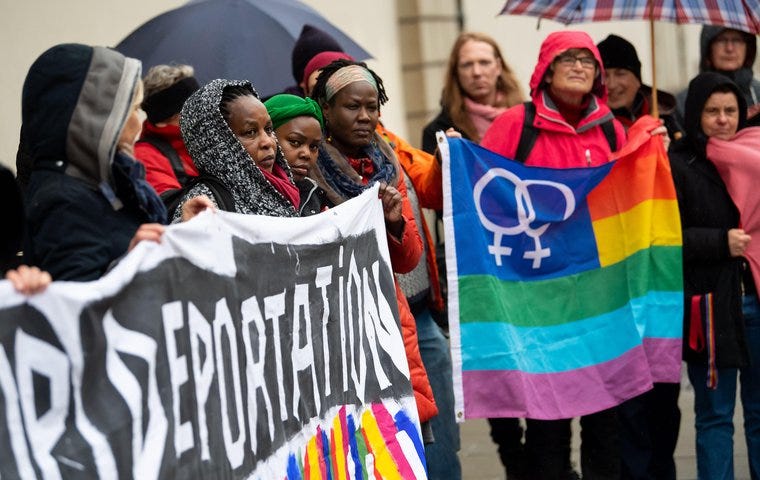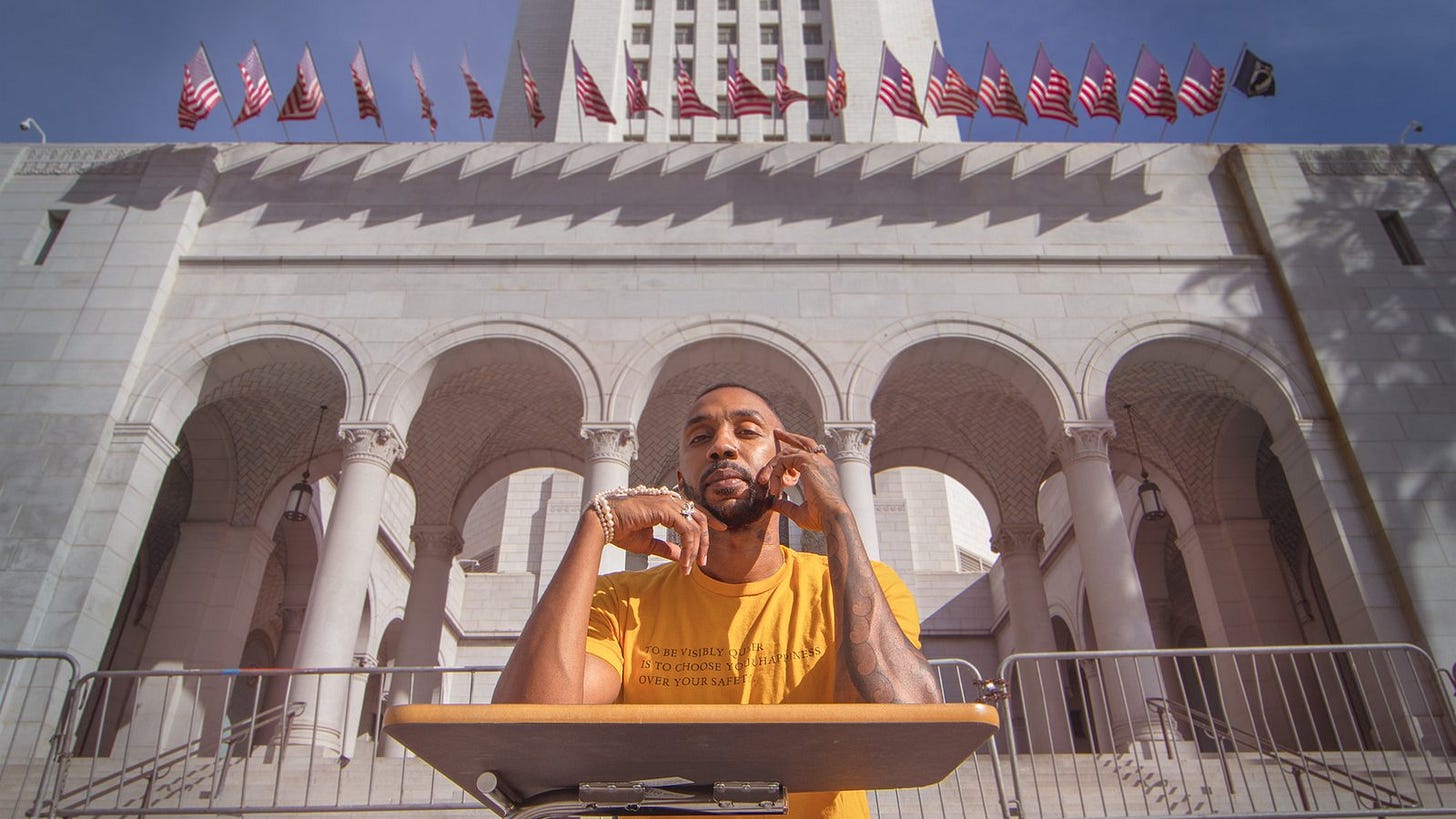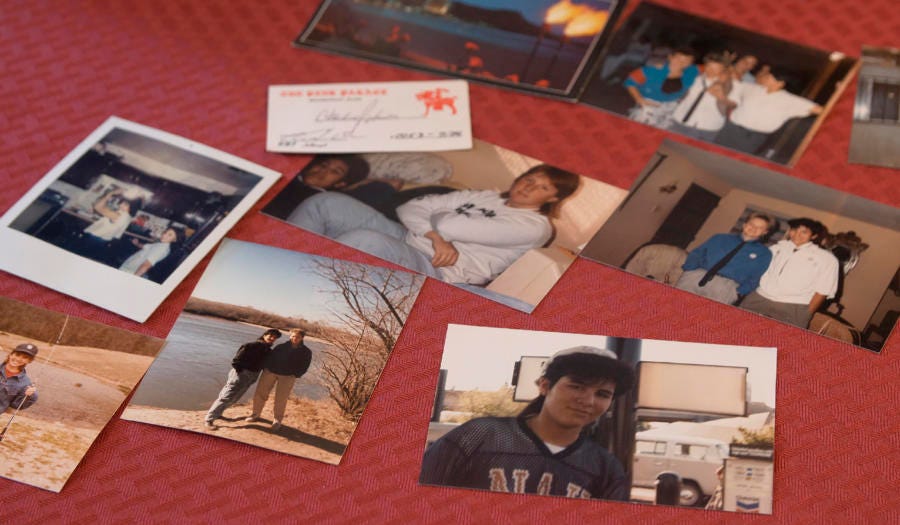Global Roundup: Indonesia Passes Sexual Violence Law, LGBTIQ People in Rwanda, Protest in Turkey Against Women’s Group Closure, Black Queer Author vs Book Bans, LGBTQ Latinx History Documentary
Curated by FG contributor Samiha Hossain
An International Women's Day rally in Jakarta, Indonesia, in March. The new sexual abuse laws have faced opposition from conservative groups in the country. Photograph: Tatan Syuflana/AP via The Guardian
Last week, Indonesia passed a landmark bill that has been a goal of activists for decades, and which for the first time outlaws forced marriage and sexual harassment. The new law criminalizes nine forms of sexual violence, including physical and verbal assault, harassment, forced sterilization and exploitation. It also includes prison sentences and stipulates that a court must compel convicted abusers to pay compensation to victims, who must also be offered counselling. Sexual violence has been rising in the country with 338,496 cases in 2021 – up from 220,000 in 2020.
The law was proposed by the National Commission on Violence Against Women (Komnas Perempuan) and civil society groups 10 years ago. It was first deliberated by the House of Representatives in 2016. Conservative groups have opposed the legislation arguing the bill’s definition of sexual violence supported liberal values that allowed “deviant” sexual behaviours.
When I heard the knock [of the gavel], my mask was just filled with tears. I was trembling so much. I think my voice was the loudest in the room. I kept screaming thank you and thank you. - Imbaniasih Achmad, 56
Willy Aditya, deputy chair of the team that spearheaded the bill, said the deliberations had been “intensive” and included input from civil society up until “the last seconds.” The director of the Jakarta chapter of the Legal Aid Foundation of the Indonesian Women’s Association for Justice, Siti Mazumah, said the bill signalled a new beginning for the country. However, Mazumah recognizes that survivors also face many cultural barriers.
Now we have to make sure that the government will provide the instruments and facilities for this law so it can be implemented. The capacity building of every related institution; making sure they understand how to work with each institution, understand the victims’ perspective, the victims’ rights. - Siti Mazumah
'Stop deportation for LGBTIQ and all,' protesters in Munich demand in 2020/Sven Hoppe/dpa/Alamy Live News via Open Democracy
The UK government announced new proposals to resettle asylum seekers in Rwanda, which rights groups say will be particularly harmful to LGBTIQ people. The new agreement means that LGBTQI people who faced grave danger in their home countries and sought protection in the UK will be sent to a country where it’s unsafe to be openly LGBTIQ.
It’s appalling for everyone. But for LGBTIQ people in particular, it’s substantially worse. The government must abandon this problematic agreement. There will be legal challenges to this. - Sonia Lenegan, legal and policy director at Rainbow Migration
A Human Rights Watch report last year found that Rwandan authorities rounded up and arbitrarily detained more than a dozen gay and transgender people, sex workers, street children, and others in the months before a planned high-profile international conference in June 2021. The report collected testimonies from LGBTIQ people in Rwanda who alleged that security officials accused them of “not representing Rwandan values.” Rwanda does not have laws against homosexual and gender non-conforming conduct. But this does not mean it is a safe place for people who identify as LGBTIQ.
[The law] does not criminalize homosexuality but also does not recognize it officially. We don’t have laws protecting LGBTIQ people. There is stigma in the family, workplace and schools. - Anonymous community organizer
Lenegan says a similar previous agreement between Israel and Rwanda saw thousands of asylum seekers being transferred to Rwanda, but almost all left the country immediately to pursue the dangerous journey to Europe again. Despite this, the UK government has sought to introduce similar “offshoring” provisions in the Nationality and Borders Bill, which will return to the UK House of Commons this week. Advocates have warned that the process could make it even more difficult for a person to “prove” their sexual orientation or gender identity.
The UK Home Office said it does not believe the new scheme will put LGBTIQ people in danger. Rwanda government spokesperson Yolande Makolo also said “all people, including those identifying as LGBTIQ, can feel safe” in the country. Nonetheless, the community and activists are urging others to listen to their lived experiences and asserting that the scheme will harm LGBTIQ people.
Women protested the closure case filed against the ‘We Will Stop Femicide Platform Association’ in Ankara on Saturday. (AFP) via Arab News
Hundreds of people demonstrated on Saturday in several Turkish cities including Istanbul and Ankara against a move to close one of the country’s most respected and largest women’s rights groups. Last week, We Will Stop Femicide (WWSF) was issued with a letter demanding the group is dissolved on public security grounds and organizers now face a lengthy court battle to stay open. The prosecutors claim the group broke the law and acted with immorality by “disintegrating the family structure by ignoring the concept of the family under the guise of defending women’s rights.” Hundreds of demonstrators shouted “Don’t prosecute women, but murderers!”
We don’t see this as just an attack on us. For us, this is an attack on all women in Turkey, on all social movements, on the entire democratic public opinion. - Fidan Ataselim, general secretary of WWSF
The association was a vocal critic of President Recep Tayyip Erdogan’s decision last year to pull Turkey out of the Istanbul Convention, which requires countries to set up laws aimed at preventing and prosecuting violence against women. Ataselim said the lawsuit was filed based on a complaint registered by a group of Turks through a website set up by the presidency to field citizens’ requests.
Ultimately, this is a divisive act intended to pit women against each other. It’s sowing further social division going forth as a way to go into an election cycle as well – Erdoğan is pitting women against women in an attempt to shore up support of religious, pious, conservative women against these women who they can say are immoral. They’re trying to make a culture war out of this. - Emma Sinclair-Webb, Turkey director of Human Rights Watch
WWSF, with 750 active members, was founded in 2010 in response to the murder of a 17-year-old student by her partner. It has a nationwide network providing legal support to survivors of domestic violence, as well as collecting data on femicide, monitoring trials and organizing rallies. Femicides are on the rise in Turkey: WWSF estimates that 416 women were killed because of their gender last year, and a further 72 murdered from January to March 2022.
Şükran Eroğlu, from the Istanbul Bar Association’s women’s rights centre, said she had anticipated the authorities’ attack on WWSF after changes to the law earlier this year limiting freedom of association. She believes women’s associations are targets because the women’s movement is on the rise in Turkey. Activists are not ready to give up and are determined to fight.
This is an attack on women’s right to life. So we will never give up our rights, our struggle. We will fight together with the public so that this unlawful step can be reversed. - Gülsüm Kav, founder of WWSF
Award-winning writer George M. Johnson poses for a portrait outside City Hall in Los Angeles, Calif., on March 25, 2022. | Meklit Gebre-Mariam for Global Citizen
Award-winning writer, executive producer, and New York Times-bestselling author of All Boys Aren't Blue, George M. Johnson, has written an essay for Global Citizen in which the author reflects on growing up as a Black queer person in the United States and why writing became a powerful tool for writing themselves and other Black queer youth into history. They reflect on what impact the attempts to ban their book have had and why the bans have further galvanized them to fight for stories like theirs to be told.
In 2021, All Boys Aren't Blue was named one of the top 10 teen titles of 2021 by the Young Adult Library Services Association (YALSA) of the American Library Association (ALA). In the same year, the book was targeted with attempted bans, along with other titles, in public libraries and schools around the country.
My identity as a Black non-binary person allows me to see the world through a lens that has always existed, but rarely ever given the chance to tell the story. - George M. Johnson
Johnson discusses their youth and the impact of not seeing themselves represented in stories. They do not want another generation to experience what they went through and so they became an author and a writer. They also view writing as a form of activism.
Growing up as young Black queer person in America can often put you in a place where you are defending your Blackness against white supremacy, while also fighting against the denial of your Blackness, because queerness has often been viewed as a threat to it. Part of the work I do as a writer helps bridge that gap in Black communities by attempting to break the conditioning that taught us to be homophobic, misogynistic, and transphobic. - George M. Johnson
All Boys Aren’t Blue showcases a true depiction of the Black family dynamic raising an effeminate queer boy. Since that first attempt to ban their book in October 2021, it has been pulled from libraries or challenged in nearly 20 states. Johnson has also dealt with two criminal complaints in Florida, one in North Carolina, and the Iowa Senate attempt to pass a bill making the dissemination of their work and others to youth a crime. The works of Black authors, Black queer authors, and a few others have been under attack for several months. Johnson says these book bans are tied to the fear resulting from the demographics of America becoming less white.
Johnson believes “the first person you have to be an activist for is yourself.” so they tweeted about the bans, which caught the attention of national media. Then they began offering tips to those who supported their book, as well as assisting librarians, teachers, and students with how to fight back against these bans.
Black queer people deserve the right to do more than just survive and exist. We deserve the full right to enjoy life on our terms. And until that day comes, I will continue to fight for it, even if I never see it happen in my lifetime. - George M. Johnson
A scene from the documentary, The Whistle,” which was filmed in Albuquerque. (Courtesy of StormMiguel Florez)... via Albuquerque Journal
The Whistle is a film that tells the story of a group of predominantly Latina lesbians who came out as youth in the ’70s and ’80s in Albuquerque, New Mexico, and the secret code they used to find each other and build community. The documentary premiered in a theater in 2019 but will also premiere on New Mexico PBS this week.
The film collects and preserves a little known piece of LGBTQ and Latinx history, and explores the resiliency of queer communities during that time. StormMiguel Florez, who is a trans man and Albuquerque native, spent years working on the film. In search of the origin of a secret lesbian code he had learned as a teenager – the “dyke whistle” – he uncovered the humorous, heart-breaking and oft-forgotten stories of the local LGBTQ community. The film made its run on the festival circuit and had success.
I did a lot of online panels for the film. We also got to broadcast on public television in Mexico. The film resonates with a lot of people. It’s a story that is unique and universal at the same time. - StormMiguel Florez
Being able to broadcast on New Mexico PBS has always been one of Florez’s goals. He hopes that other PBS stations across the country will also pick it up
I want New Mexicans to know about this story. It did give people a sense of community. I decided to centralize the whistle because it is unique to New Mexico. The film needed to be about our community. - StormMiguel Florez
Samiha Hossain (she/her) is a student at the University of Ottawa. She has experience working with survivors of sexual violence in her community, as well as conducting research on gender-based violence. A lot of her time is spent learning about and critically engaging with intersectional feminism, transformative justice and disability justice.
Samiha firmly believes in the power of connecting with people and listening to their stories to create solidarity and heal as a community. She refuses to let anyone thwart her imagination when it comes to envisioning a radically different future full of care webs, nurturance and collective liberation.






